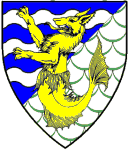| View previous topic :: View next topic |
| Author |
Message |
Capn Jack
Joined: 01 Oct 2007
Posts: 525
City/Region: La Conner
State or Province: WA
C-Dory Year: 1988
C-Dory Model: 16 Angler
Vessel Name: Pocket Yacht
Photos: Pocket Yacht
|
 Posted: Fri Feb 08, 2008 5:46 pm Post subject: Propane Onboard Posted: Fri Feb 08, 2008 5:46 pm Post subject: Propane Onboard |
 |
|
The following is my 2 cents worth and based entirely on my own experience with Propane appliances (namely freezers, or refrigerators) installed in a power boat. These references are aimed particularly at outboard powered, open, or semi-open boats, such as the C-Dory
Explosion Hazard:
We’re talking hazards that may be caused by the open flame (used by the unit to heat the capillary tube) coming in contact with, propane fumes, or gasoline fumes, trapped in a bilge, or other enclosed area. *See Rule #2, #4 & #5
Air circulation and Exhaust Venting:
“CO”: Carbon Monoxide, or Lack of Oxygen: Anoxia or Hypoxia. All or any of these can be caused by the operation of an open flame in a tightly enclosed area. People have died as a result of being exposed to these conditions. *See Rule #3 & #5
Fuel container Venting:
Fuel cylinders can be mounted in the OB well to vent overboard. *See Rules #1 & #2
Level Operation:
The only item missing from governmental legislation.  …The unit should be installed so that, when the boat is at rest, the tubes on the back are aligned and level from port, to starboard, (not fore and aft) while the unit is as close to level (fore and aft) as possible. This position will help keep refrigerant moving freely in the coils. * The unit should not be operated while the boat is at high speed if it would become off of level. Turn the unit off while traveling and turn it on when stopped. *See Rule #1 & #5 …The unit should be installed so that, when the boat is at rest, the tubes on the back are aligned and level from port, to starboard, (not fore and aft) while the unit is as close to level (fore and aft) as possible. This position will help keep refrigerant moving freely in the coils. * The unit should not be operated while the boat is at high speed if it would become off of level. Turn the unit off while traveling and turn it on when stopped. *See Rule #1 & #5
I realize there are numerous government regulations and guide lines that have been written to protect the consumer from him or herself concerning these matters. 
My rules are:
1. If you don’t know how it works, Find Out.
2. If you’re going to use it…Maintain It.
3. Don’t sleep with the windows tightly closed.
4. Use your nose…A very good leak detector
5. When in Doubt…Turn It Out!
OK, OK. That was 25 cents worth….”An explosion, or fire at sea will ruin your day”.
 |
|
| Back to top |
|
 |
Sea Wolf
Joined: 01 Nov 2003
Posts: 8650
City/Region: Redding
State or Province: CA
C-Dory Year: 1987
C-Dory Model: 22 Cruiser
Vessel Name: Sea Wolf
Photos: Sea Wolf
|
 Posted: Fri Feb 08, 2008 6:18 pm Post subject: Posted: Fri Feb 08, 2008 6:18 pm Post subject: |
 |
|
Capn Jack
Couldn't agree with you more!
I often do things my own way, using common sense and my technical understanding, but have learned not to tout unconventional ways on this site as there is always someone who wants to argue that you're violating some rule of the accepted safety code.
Not everyone is comfortable with making their own rules since they lack the understanding of the reasons behind the accepted procedures enough to be aware of what risks they might be incurring and how to manage them.
I wrote recently in regard to batteries and electricity:
"P.S.: I know all the common admonitions about all the electrical and other systems on a boat, but think you have to think twice about them. Figure out why they were created, then to what degree you're going to encounter the implied risk in your situation, then use your judgment to make a reasoned intelligent choice. There are those who will only be gleefully happy to point out the axiom you've violated, but they're usually not thinking, just quoting the rule. My background in physics and chemistry tells me to look beyond the rule to the why and how things work, then decide."
The above is written to state sincerely how i feel, and not intended to be arrogant or otherwise critical.
P.S.: My propane tank is in he engine well, like you suggested.
Cheers!
Joe.  
_________________
Sea Wolf, C-Brat #31
Lake Shasta, California
  
"Most of my money I spent on boats and women. The rest I squandered'. " -Annonymous
Last edited by Sea Wolf on Sat Feb 09, 2008 7:54 am; edited 1 time in total |
|
| Back to top |
|
 |
tsturm
Joined: 01 Nov 2003
Posts: 1134
City/Region: Soldotna
State or Province: AK
C-Dory Year: 2003
C-Dory Model: 25 Cruiser
Vessel Name: JMR TOO
Photos: JMR-TOO
|
 Posted: Fri Feb 08, 2008 7:58 pm Post subject: Re: Propane Onboard Posted: Fri Feb 08, 2008 7:58 pm Post subject: Re: Propane Onboard |
 |
|
| Capn Jack wrote: | The following is my 2 cents worth and based entirely on my own experience with Propane appliances (namely freezers, or refrigerators) installed in a power boat. These references are aimed particularly at outboard powered, open, or semi-open boats, such as the C-Dory
Explosion Hazard:
We’re talking hazards that may be caused by the open flame (used by the unit to heat the capillary tube) coming in contact with, propane fumes, or gasoline fumes, trapped in a bilge, or other enclosed area. *See Rule #2, #4 & #5
Air circulation and Exhaust Venting:
“CO”: Carbon Monoxide, or Lack of Oxygen: Anoxia or Hypoxia. All or any of these can be caused by the operation of an open flame in a tightly enclosed area. People have died as a result of being exposed to these conditions. *See Rule #3 & #5
Fuel container Venting:
Fuel cylinders can be mounted in the OB well to vent overboard. *See Rules #1 & #2
Level Operation:
The only item missing from governmental legislation.  …The unit should be installed so that, when the boat is at rest, the tubes on the back are aligned and level from port, to starboard, (not fore and aft) while the unit is as close to level (fore and aft) as possible. This position will help keep refrigerant moving freely in the coils. * The unit should not be operated while the boat is at high speed if it would become off of level. Turn the unit off while traveling and turn it on when stopped. *See Rule #1 & #5 …The unit should be installed so that, when the boat is at rest, the tubes on the back are aligned and level from port, to starboard, (not fore and aft) while the unit is as close to level (fore and aft) as possible. This position will help keep refrigerant moving freely in the coils. * The unit should not be operated while the boat is at high speed if it would become off of level. Turn the unit off while traveling and turn it on when stopped. *See Rule #1 & #5
I realize there are numerous government regulations and guide lines that have been written to protect the consumer from him or herself concerning these matters. 
My rules are:
1. If you don’t know how it works, Find Out.
2. If you’re going to use it…Maintain It.
3. Don’t sleep with the windows tightly closed.
4. Use your nose…A very good leak detector
5. When in Doubt…Turn It Out!
OK, OK. That was 25 cents worth….”An explosion, or fire at sea will ruin your day”.
 |
& remember propane can't go BOOM unless it reaches that magical 14.7:1 air fuel ratio  Always have a vent(#3) Always have a vent(#3)   |
|
| Back to top |
|
 |
Larry H
Joined: 02 Nov 2003
Posts: 2041
City/Region: Tulalip,
State or Province: WA
C-Dory Year: 1991
C-Dory Model: 22 Cruiser
Photos: Nancy H
|
 Posted: Fri Feb 08, 2008 8:06 pm Post subject: Posted: Fri Feb 08, 2008 8:06 pm Post subject: |
 |
|
I have had propane cooking and heating on three boats and I am still here!! LOL
But, a propane flame which works automatically and cannot be seen is NOT safe.
That rules out a RV propane refrigerator.
The above are my opinions.
_________________
Larry H

A C-Brat since Nov 1, 2003
Ranger Tug 27 ex 'Jacari Maru' 2017 - 2022
Puget Trawler 37 ex 'Jacari Maru' 2006-2017
1991 22' Cruiser, 'Nancy H'--1991-2006 |
|
| Back to top |
|
 |
thataway
Joined: 02 Nov 2003
Posts: 20821
City/Region: Pensacola
State or Province: FL
C-Dory Year: 2007
C-Dory Model: 25 Cruiser
Vessel Name: thataway
Photos: Thataway
|
 Posted: Fri Feb 08, 2008 10:01 pm Post subject: Posted: Fri Feb 08, 2008 10:01 pm Post subject: |
 |
|
I agree with Larry--most of my voyaging boats had propane stoves and ovens, but the boats were diesel powered, had propane lockers which were sealed so that no propane could leak into the living or engine space, and were vented overboard. We found that with full time cooking and baking we would get 6 months out of two regular sized propane bottles.
Equally as important is that the propane be shut off at the tanks when you are not cooking. That was accomplished with a selnoid valve attatched to a switch in the galley and the two sniffers. One sniffer near the deepest part of the bilge, and the other in back of the stove. I have seen several propane explosions caused by leakage from the flex tubing where the propane enters the stove.
We have never personally used LPG for heating--we have found that diesel is better (cheaper and safer in our opinion)--I realize that some folks do heat with propane or LPG.
LPG, water heaters or refigerators--not for us on boats; fine on RV's. But I have seen them "safely" used with proper precautions. One of my indeliable memories was in 1946 when a lovely 70+ foot sailboat named "Sea Hawk" exploded and burned from a propane leak just down the dock from my father's boat.
_________________
Bob Austin
Thataway
Thataway (Ex Seaweed) 2007 25 C Dory May 2018 to Oct. 2021
Thisaway 2006 22' CDory November 2011 to May 2018
Caracal 18 140 Suzuki 2007 to present
Thataway TomCat 255 150 Suzukis June 2006 thru August 2011
C Pelican; 1992, 22 Cruiser, 2002 thru 2006
Frequent Sea; 2003 C D 25, 2007 thru 2009
KA6PKB
Home port: Pensacola FL |
|
| Back to top |
|
 |
|
|
You cannot post new topics in this forum
You cannot reply to topics in this forum
You cannot edit your posts in this forum
You cannot delete your posts in this forum
You cannot vote in polls in this forum
You cannot attach files in this forum
You cannot download files in this forum
|
|

 Search
Search Private Messages
Private Messages Profile
Profile Log in
Log in Register
Register Help
Help

 …The unit should be installed so that, when the boat is at rest, the tubes on the back are aligned and level from port, to starboard, (not fore and aft) while the unit is as close to level (fore and aft) as possible. This position will help keep refrigerant moving freely in the coils. * The unit should not be operated while the boat is at high speed if it would become off of level. Turn the unit off while traveling and turn it on when stopped.
…The unit should be installed so that, when the boat is at rest, the tubes on the back are aligned and level from port, to starboard, (not fore and aft) while the unit is as close to level (fore and aft) as possible. This position will help keep refrigerant moving freely in the coils. * The unit should not be operated while the boat is at high speed if it would become off of level. Turn the unit off while traveling and turn it on when stopped. 







